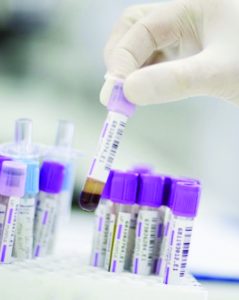Alejandro Miranda-Sousa, M.D.
 The prostate gland is a tiny fig sized organ that lies just beneath the bladder; the urethra runs through the prostate releasing urine from the bladder. The prostate also produces semen and can become enlarged, infected and cancerous as men age. Prostate cancer is the third leading cancer among males. It is often a silent killer, as it rarely shows signs or symptoms until it has developed maturely and even metastasized into other areas of the body. This year alone, it will take over 26,000 men’s lives. But it doesn’t have to be this way; just a simple examination and getting regular checkups can alleviate these grim statistics.
The prostate gland is a tiny fig sized organ that lies just beneath the bladder; the urethra runs through the prostate releasing urine from the bladder. The prostate also produces semen and can become enlarged, infected and cancerous as men age. Prostate cancer is the third leading cancer among males. It is often a silent killer, as it rarely shows signs or symptoms until it has developed maturely and even metastasized into other areas of the body. This year alone, it will take over 26,000 men’s lives. But it doesn’t have to be this way; just a simple examination and getting regular checkups can alleviate these grim statistics.
There are several different standard tests that urologists use to determine Prostate cancer or prostate disorders in men. The first is a digital examination by palpitating the prostate through the rectum to feel if it is enlarged. The second testing is done through a PSA (prostate-specific antigen) count. The blood is tested for these specific protein-synthesized prostate cells, the higher the number of PSA, the more likelihood of impending prostate cancer. There is also a more advanced test of free range prostate PSA cells; this test typically shows high in men that already have undiagnosed prostate cancer. The earlier your PSA levels are checked, the better your chances of successful treatment and survival rate of prostate cancer.
The normal PSA level is 4.0, which is four nanograms per milliliter of blood (ng/ml), but in younger men, an average of 2.5 ng/ml is normal, while in older men a reading above four may not necessarily be alarming.
Some of the alternative reasons your PSA could be high are the following:
• Being elderly
• Having an enlarged prostate
• Infection of the prostate
• Continuous pressure on the prostate (i.e. from tight clothing or bike riding)
• Prescription Medications
In addition to high PSA counts, certain medications, herbal supplementation, or being overweight can have the counter effect on your levels. For example, a person taking a daily aspirin may have a lower PSA level due to the effect of the medicine on the blood protein count. Before you are tested, it’s imperative to tell your physician everything that you are taking, or any other health conditions or symptoms that you are experiencing. Other more detailed additional testing for the prostate includes transrectal MRI or transrectal ultrasound, as well as biopsies.
Even though there are rarely signs of early prostate issues, some of the most common symptoms of the disorder are:
• Weak urination
• Interrupted urination
• Frequent urination
• Blood in urine
• Painful ejaculations
• Pain in pelvis, hips or thighs
Treatment:
All treatment options are not going to be suitable for every prostate cancer case. Depending on the patient’s overall health, age, stage of cancer, PSA or Gleason scores, size of the tumor, and personal circumstances, the treatment may vary significantly. For some patient’s hormone therapy, a “watch and wait” approach, or a simple surgical removal may be appropriate, while for others radiation therapy or more invasive surgical and oncology options are better suited. You should always consult with an experienced urologist to determine your best plan of action when dealing with any prostate issues.
The urologists at Urology Experts are highly-
qualified, skilled experts in the area of prostate cancer, urinary, and bladder disorders, and pelvic floor prolapse, along with many other related disorders. Dr. Alejandro Miranda-Sousa is the author and co-author of multiple research and clinical peer-reviewed medical articles. He received the Best Abstract Award from the American Urological Association in 2007 and is Fellowship Trained in Urodynamics and Neurourology. Dr. Sousa and his staff are ready to answer any of your urological questions and concerns, as they treat all of their patients with the utmost of care.
To make an appointment, please call 239-226-2727, or visit their website at urologyexperts.com.
239.226.ASAP (2727)
www.UrologyExperts.com
Urology Experts
Fort Myers
8931 Colonial Center Dr.
Suite 100 A
Fort Myers, FL 33905
Bonita Springs/Estero
3501 Health Center Blvd.
Suite 2420
Bonita Springs, FL 34135
Cape Coral
2721 Del Prado Blvd.
Suite 220
Cape Coral, FL 33904










